
The COVID-19 pandemic brought with it many changes in healthcare. One major impact was the number of physicians who chose to change jobs. A 2022 CHG Healthcare survey of more than 500 physicians found that 43% of physicians changed jobs and 8% retired during the pandemic; 3% left medicine to pursue non-clinical careers.
According to the Association of American Medical Colleges (AAMC), the average annual turnover rate for physicians is 6-7%. While the 43% finding of this survey was spread over two years, it still shows a major disruption in the physician workforce. The U.S. Bureau of Labor Statistics also reported that healthcare workers hit an all-time high unemployment rate of 10.3% in April 2020 compared to an average rate closer to 2.7%.
Physician career changes 2020 - 2022
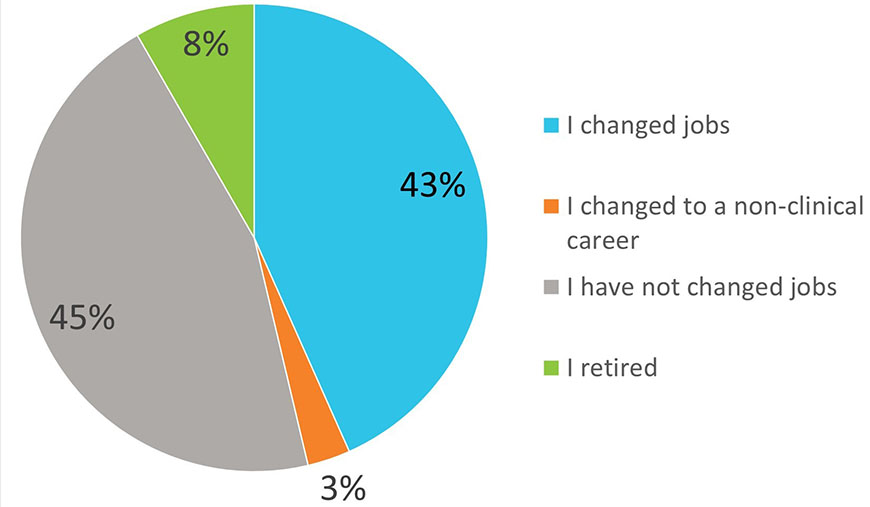
The primary motivation for making their career change of physicians surveyed was a desire for better work/life balance. This reinforces data from another CHG survey conducted in early 2022 that found work/life balance was the number one benefit new physicians were looking for in their first jobs.
Primary motivators for making career change
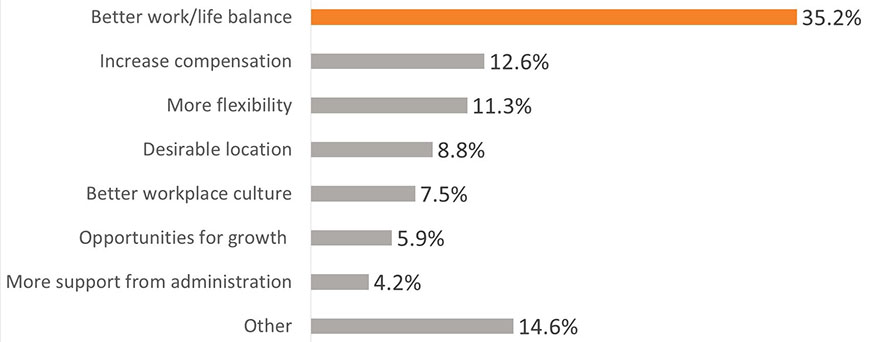
Breaking findings down by career stage shows that work/life balance was the number one issue for early, mid- and late-career physicians, but it also highlights that some motivators differ by career stage. For example, mid-career physicians were far more interested in better workplace culture (16%), while late career physicians were highly motivated by more flexibility (21%). Early career physicians were motivated by a more desirable location (16%).
Primary motivators for making career change, by career stage
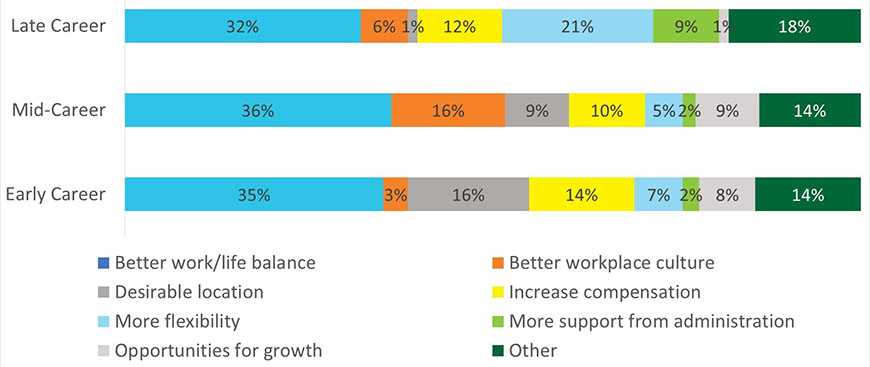
Pandemic brought need for change
Of those who changed careers, 42% indicated the pandemic was very influential or extremely influential in their decision compared to 36% who said it was not at all or only slightly influential. For retirees, 31% said the pandemic was very influential or extremely influential in their decision to retire.
How influential was the impact of the pandemic on your decision to…

*including changes to a non-clinical career
The primary reasons cited by physicians for how the pandemic impacted their careers were unsustainable levels of burnout and stress, unhappiness with their administration’s response to the pandemic, and unhappiness with the way medicine is changing.
Ways the pandemic impacted career decisions
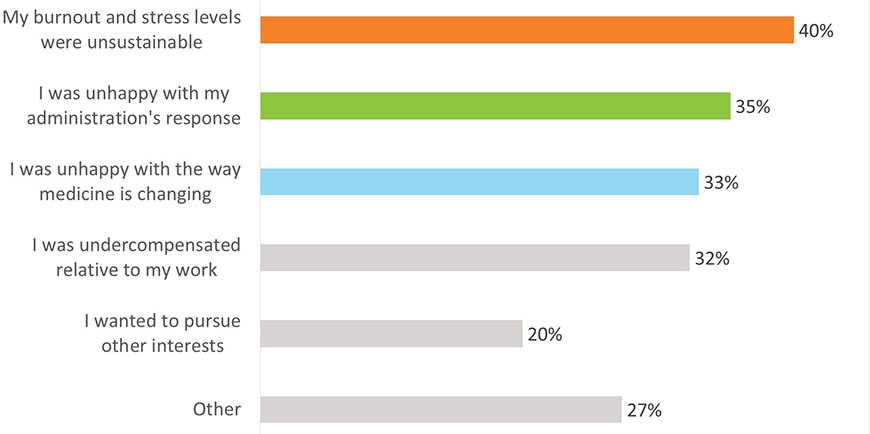
For those who indicated they were unhappy with their administration’s response, the top issues were poor leadership, lack of employer support, and insufficient staffing levels.
Top concerns with administration response
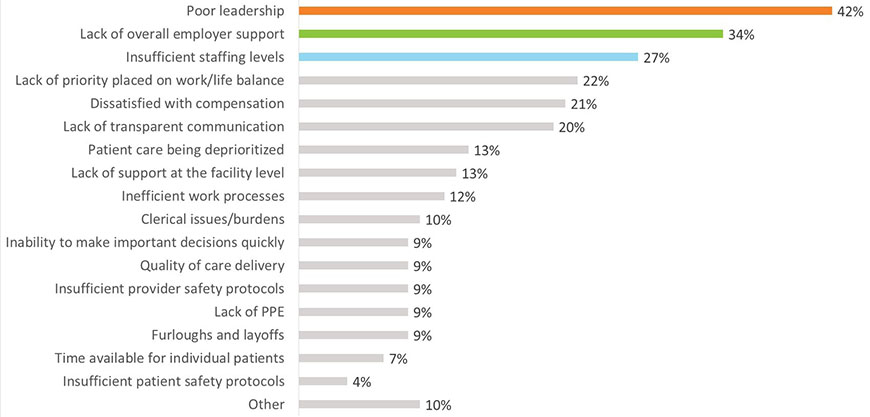
Impact of layoffs, and personal and family safety
In the open responses about the impacts caused by the pandemic, a few themes emerged. Among the more prominent issues were furloughs and lay-offs, safety, and concerns about family.
Furloughs/lay-offs:
- I am a surgeon and the hospital (where I was a permanent physician) did not have enough volume to support five surgeons. Therefore, I started working locums. I still have not had an increase in volume over the last year (due to COVID).
- My income dropped and I had to take another job to pay my bills.
- Unable to find a job and forced to stay in training program longer. Several co-fellows came from practicing for fellowship due to lost jobs from decreased procedures, due to COVID restrictions.
Safety:
- Risk of getting COVID-19 with already having underlying chronic health issues.
- Outreach clinic not set up to safely do patient care with needed precautions during pandemic conditions, lacked resources to respond to needs.
- My wife is immunosuppressed, and I am a heart patient. I did not feel it was safe to continue in-person care during pandemic so changed to telemedicine.
Family:
- I lost my best friend to COVID. I want to spend more time with my family and friends.
- Family obligations, caring for kids, and constant school closures from COVID exposure and quarantine requirements.
- Family and personal pursuits were very important to me.
- With my kids out of school, moving was easier.
Where physicians chose to go
In choosing new positions, 39% accepted positions in different practice settings, 31% worked locum tenens assignments, 25% accepted positions in practice settings similar to their current practice, and 10% made the switch to telehealth.
Type of job change
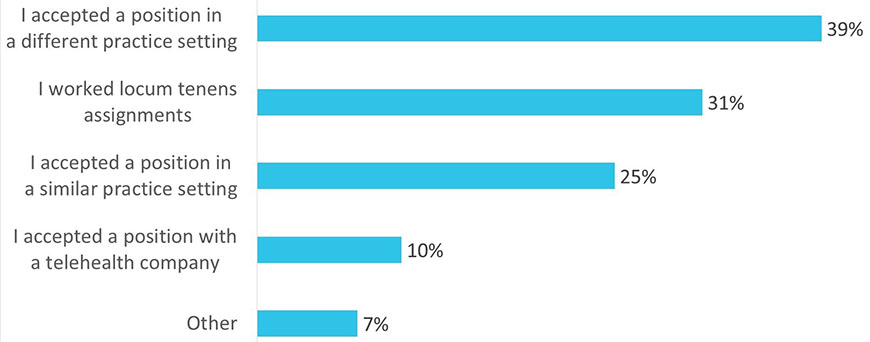
The change in practice setting may be following a trend of inpatient admissions being down. According to the Strata Decision National Patient and Procedure Volume Tracker inpatient admissions have been down 11.5% compared to 2019 numbers while outpatient volume has been up 5% during the same time.
For those physicians who DID NOT make a career change in the past two years, 73% are extremely or somewhat likely to stay in their current position through the end of the year. That commitment to stay drops to 59% through 2023 and 46% after 2023 and beyond.
Likelihood to remain in job
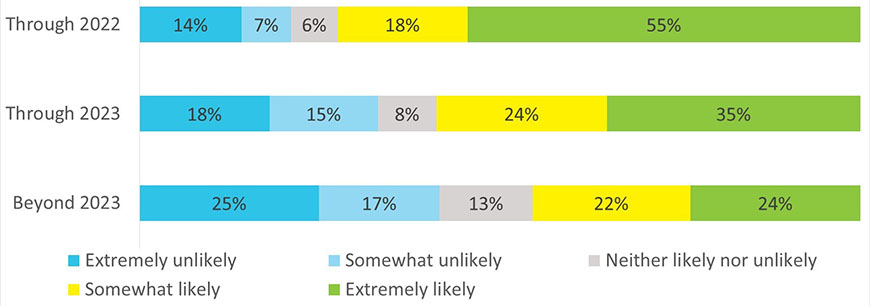
However, while most physicians may be looking for new jobs in the next few years, very few indicated a desire to leave medicine; just 13% say they intend to leave the industry by 2023.
Likelihood to remain in healthcare
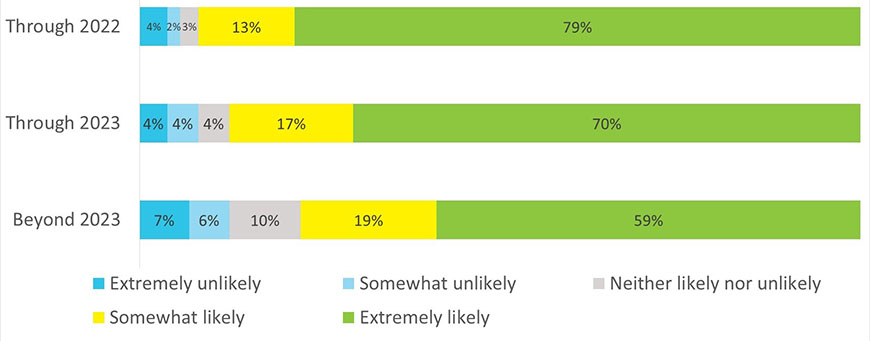
Methodology
CHG Healthcare surveyed 534 physicians from across the U.S. about their career changes since the beginning of the pandemic (through April 2022). The career stage of survey respondents were 40% early career, 26% mid-career, and 34% late-career.